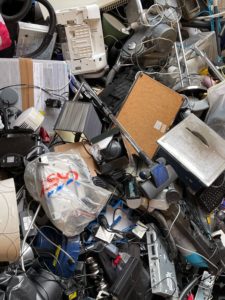Cutting global e-waste should be a top priority for COP, say experts
Cutting global electronic waste must be a top priority for COP26 – according to a survey conducted by the Chartered Institute for IT.
The experts state that the industry must end the cycle of pushing new products on ever-smaller timescales and instead must reuse and recycle e-waste.
They state that legislation on ‘rights to repair’ coming in around the world (including the UK) can help to achieve this aim, but only if it is properly promoted and supported by governments, consumers and professionals.
 The consumption rate of electronics is increasing by 3% each year and is a key contributor to e-waste, which in 2019 was responsible for 53.6 million tonnes of waste.
The consumption rate of electronics is increasing by 3% each year and is a key contributor to e-waste, which in 2019 was responsible for 53.6 million tonnes of waste.
After e-waste, the experts chose carbon transparency reporting (19%) followed by making data centres truly green (14%) as the top priorities for the tech industry.
lex Bardell, chair of the BCS Green IT Specialist Group said: ‘Most people working and leading in the IT profession agree that digital technologies should be at the heart of government and industry’s strategy to reach Net-Zero. That can be achieved by a tech industry that defines its professionalism by prioritising actions like reducing e-waste, which is already in focus thanks to the chip shortage.
‘Rather than being dependent on new devices as soon as we have a failure, the ‘right to repair’ legislation should be starting to make it easier for people to extend the life of their devices. If the starter motor failed on your car, you would go to the garage and get a new part, rather than chucking the car away.
‘The challenge is that the business model for electronics firms is to push their products, like smartphones, on ever-smaller time cycles as a way of generating revenue and it really does not need to be this way. It takes combined political, social and commercial will to put the planet ahead of an ever tighter upgrade cycle.’












